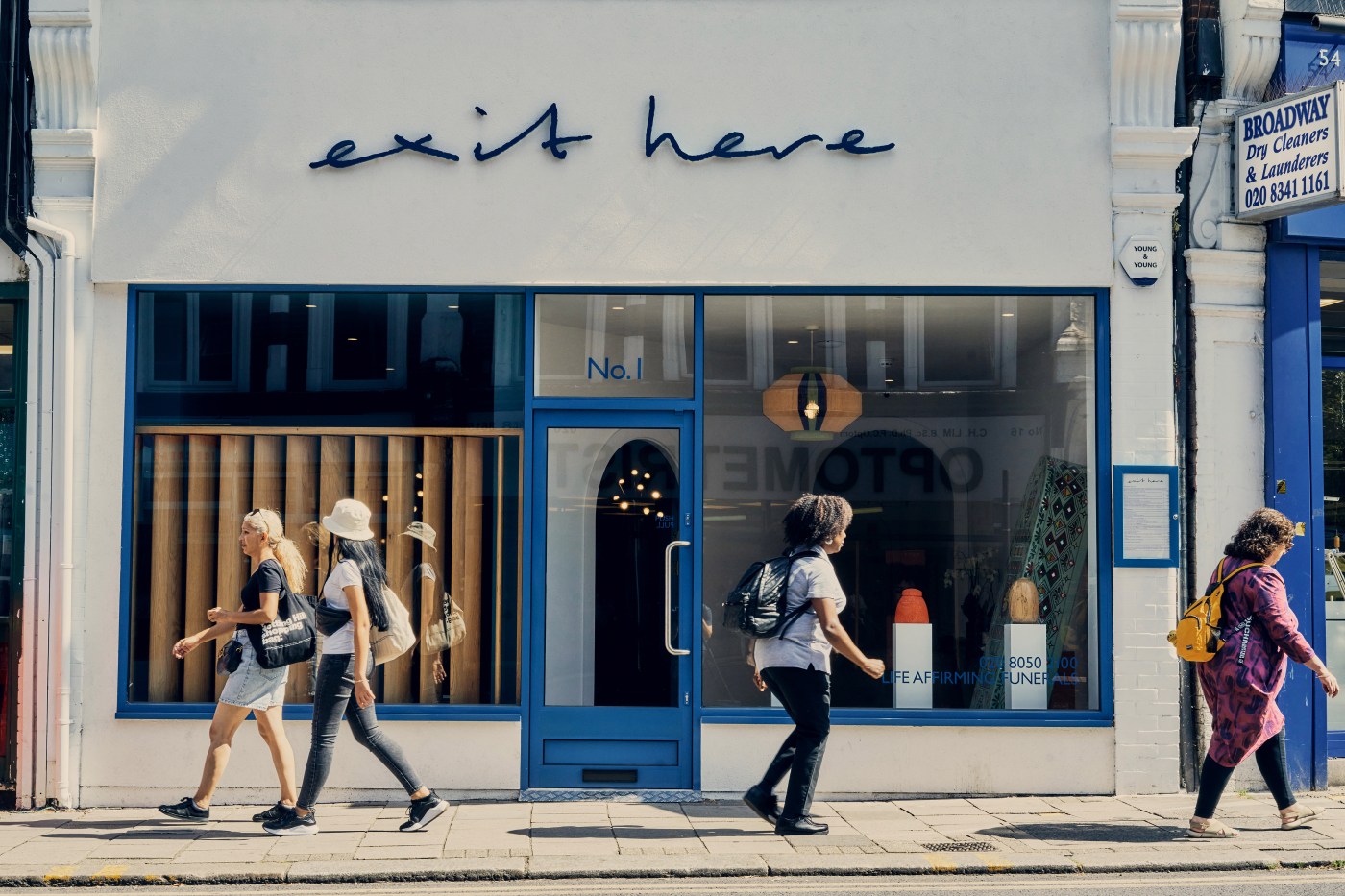
Putting some fun in funerals: Modern alternatives popping up worldwide
LONDON — In the affluent neighborhood of Crouch End in London, a new business is attracting some attention. The storefront’s blue-and-white facade is airy and minimalist. Three polka-dot vases on plinths sit in the window. To the casual observer, the space might look like an art gallery. But through the window is something a little more curious: a sea-foam-green box measuring 7 feet by 2 feet.
It’s generally upon noticing the box that passersby will do a double-take of the shop’s signage: Exit Here. The polka dot vases aren’t vases. They’re urns. The box is a coffin. And in the back, unknown to them, is a 12-person morgue.
“We knew the name would be Marmite,” said Oliver Peyton, a renowned restaurateur, comparing the polarized reactions to his funeral home’s somewhat cheeky name to those elicited by the yeasty British spread. “You either love it or you hate it. My mother-in-law hates it.”
Oliver Peyton, the restaurateur who started the Exit Here funeral homes, with one of the coffins the business sells, in London, Aug. 9, 2024. Modern, and even hip, funeral homes around the world hope to answer a question: How do we commemorate death in 2024? (Tom Jamieson/The New York Times)
Peyton, who founded the first branch of Exit Here in the neighborhood of Chiswick in 2019 as a modern alternative to traditional funeral parlors, is a familiar face on the British hospitality scene: He was the founder of the Atlantic Bar & Grill, a West London hot spot that closed in 2006, and he served as a judge on the BBC show “Great British Menu.”
Peyton, 62, who is originally from Sligo, Ireland, became interested in the mortuary business while planning a funeral for his father, who died in 2010. He felt that there weren’t enough choices in the process. “Funerals are historically a hand-me-down business,” he said, adding that people tend to use the funeral parlor that’s closest to their home.
He also believes funeral planning is not so different from hospitality. “It’s still a service industry,” he said. “We’re taking care of people at a very heightened emotional period in their lives.”
Exit Here is among a small group of funeral homes around the world — including Sparrow in New York, Poppy’s in London and Altima in Spain — with a modern feel.
The interior of an Exit Here, a modern alternative to traditional funeral homes, which evokes the furnishings at fancy private clubs, in the Crouch End neighborhood of London, Aug. 9, 2024. Modern, and even hip, funeral homes around the world hope to answer a question: How do we commemorate death in 2024? (Tom Jamieson/The New York Times)
Exit Here’s new Crouch End space, with its velvet upholstery and curved archways, resembles a fancy members-only club. Altima, a chain with 40 homes around the Catalonia region, works with architecture firm Batlleiroig to build parlors that resemble art galleries, featuring marble and lattice brickwork. The walls at Sparrow are dusty rose and forest green, and there is always incense burning.
For funeral homes, they’re surprisingly hip.
Looks aren’t everything, of course. These businesses also tend to offer nontraditional services like support groups for the bereaved and memorials personalized down to every detail.
‘It’s Going to Be Fabulous’
Steven Wilson, 47, discovered Exit Here in 2020 on a walk near his house in Chiswick. “What a brilliant name,” he thought to himself at the time. After being diagnosed with acute myeloid leukemia, which he eventually learned was terminal, he returned in March to start planning his own funeral.
Past memorials Wilson has attended have served as cautionary tales. When his boyfriend died in 2014, the minister knew nothing beyond his name. “They played a nine-minute medley of ‘November Rain,’” Wilson said, adding that he “never once” heard his boyfriend play Guns N’ Roses. “The whole thing was just utterly impersonal.”
Wilson, who worked in philanthropy, said his own funeral was going to be “fabulous,” using an alliterative curse word for emphasis. On the top of his hand was a freshly applied IV bandage.
He saw it as a gift to have the time to plan his own funeral. “It sounds strange, but I want people to enjoy it,” he said. And so, sometime probably within the next six months, his friends and family will gather in his hometown, Aberdeen, Scotland, where his body will lie in a coffin draped in a rainbow flag.
Instead of traditional programs, memory books divided into eras of Wilson’s life (“Very Taylor Swift,” as he put it) will be handed out as Jo Napthine, a former West End theater star and a professional funeral celebrant, belts numbers from Wilson’s favorite musicals: “Bring Me Home” from “Les Miserables”; “Somewhere” from “West Side Story”; “Tomorrow” from “Annie.”
And later, at the crematory: “My Way” by Frank Sinatra.
The ‘Sweetgreen’ of Funeral Homes
For much of her life, Natividad Hawkins, who lives in Hillside, New Jersey, knew of only one funeral home in the New York City neighborhood where she grew up. “It was where we all went when someone died,” said Hawkins, who arranged her mother’s funeral there in 2021. “The lady working there was very nice, but it was very much a transactional thing.”
It was only last year after attending the funeral of her childhood best friend, held at Sparrow in Greenpoint, Brooklyn, that Hawkins realized there were other options.
According to its founder, Erica Hill, people have been known to wander into Sparrow, which opened in 2021, thinking it’s a spa. The home has a morgue and two “celebration rooms,” as they’re called, for memorials, as well as a shop, where candles and condolence cards with line drawings are sold.
Hawkins, who is now in her 50s and works in tech, was struck by how beautiful the space was and how uplifting the service for her friend turned out to be.
When her brother, Francis Ortega, died in October, Hawkins knew where she wanted to hold the funeral. “As a self-aware control freak, I appreciated the fact they were never like, ‘This is how we do it,’” she said. “It was always, ‘What do you want?’”
Hill, 61, said Sparrow’s services were aimed at people who were looking for something that feels “warm and inviting.”
She likened her business to Sweetgreen or SoulCycle. “They repackage something, rebrand it and make it look cool,” she said. “What we’re doing is in the same realm.”
An urn made by Phil Irons from salvaged wood at a branch of Exit Here, a modern alternative to traditional funeral homes, in London, Aug. 9, 2024. Modern, and even hip, funeral homes around the world hope to answer a question: How do we commemorate death in 2024? (Tom Jamieson/The New York Times)
Nicola Tuer, the former chief operating officer at Sony Music in Britain and Ireland, was so taken with Exit Here’s branding that she referred to it on the mood board for the funeral of her husband, Tim Tuer, when he died of a brain tumor in October. The memorial was held at celebrity chef Rick Stein’s seafood restaurant in the neighborhood of Barnes in London, in what was the eatery’s first-ever funeral. There were personalized bottles of wine — “Have a drink on me. Château Tuer 1961” — and lovingly prepared memory books that bore the same typeface and color palette as Exit Here.
“I know it’s a silly thing to say, but we liked beautiful things, as I think a lot of people do,” Nicola Tuer, 58, said. Her husband was buried in a “gorgeous” Scandinavian coffin. “He’d have been happy to be there.”
Doing Death Differently
Aesthetic developments seem to be a reflection of changing conversations around death. “Younger people especially are getting more comfortable talking about it,” Hill of Sparrow said. Look at the rise in popularity of death doulas, who provide support for the dying — and in some cases, the grieving, too. In the United States, end-of-life planning sites like Lantern and Cake, which are marketed toward millennials, easier to navigate and more transparent about their pricing, have sprung up.
Which is not to say that so-called traditional or mainstream funeral homes are not adapting. In recent years, Co-Op Funeralcare, one of the largest funeral services providers in Britain, has changed its tune. Advertisements are now geared toward not only personalization, but also fostering openness around death. In July, the company worked with Channel 4 on a television show called “Celebrity Send Off,” in which stars and their loved ones plan and test-run a funeral.
Gill Stewart, the company’s managing director, reiterated the importance of evolving alongside its clients. Co-Op has introduced more colors for its coffins and has started offering unconventional hearse options, like a fire truck or a double-decker red bus.
A recent study conducted by Co-Op, which involved 4,000 people in the U.K., found that 68% of participants see funerals as celebrations of life as opposed to somber occasions. Stewart said that it was important for families to have options at their funeral homes that reflect those beliefs.
Sparrow hosts events that reflect the evolving attitudes about funerals, including grief circles; a death-themed comedy show; guided meditations; and several death cafes, where people who are dying or coping with grief can eat pastries and connect. Exit Here, too, holds regular coffee gatherings for the bereaved.
Similar initiatives are underway at Poppy’s, a funeral home the color of a clementine in southwest London. An ad campaign for the company last year involved plastering tube stations around the city with posters that read: “1861 called. They want their funeral traditions back.” The vehicles used by Poppy’s to pick up the recently deceased are a soothing shade of lilac. They’re also electric.
“Whatever you end up choosing or wanting for the funeral, you want to be treated like a human,” said Poppy Mardall, 41, who worked for Sotheby’s before pivoting to the mortuary business. You don’t want to be “upsold on packages when you are grieving,” she added.
The Price of Death
A coffin with clean curves in a soft pastel offered by Exit Here, a modern alternative to traditional funeral homes, in London, Aug. 9, 2024. Modern, and even hip, funeral homes around the world hope to answer a question: How do we commemorate death in 2024? (Tom Jamieson/The New York Times)
Of course, amid all this is the looming matter of cost. Wilson, for example, is using a “very nice” six-figure insurance payout, from a critical illness policy he took out a few years ago, to execute his funeral vision. “I’m extremely fortunate to have that money,” he said.
But what all these places reiterate is that whatever the budget, they can typically make it work. “The perception, which drives me slightly mad, is that a place that looks nice will cost more,” Peyton said.
In reality, personalized services do tend to come with a higher price tag — but not always. For example, in addition to Exit Here’s signature wooden coffin, which has a retail price of 1,950 pounds (about $2,500), there is also a biodegradable cardboard model that costs 570 pounds (about $730). As for the funerals themselves, prices are as extravagant as the service permits.
Last year, as found by insurance company Sun Life in its long-running “Cost of Dying” report, the average cost of a “basic” funeral — burial or cremation; funeral home fees; a midrange coffin; a limousine; and celebrant fees — in London was 5,171 pounds (about $6,700).
In the U.S., according to a 2023 study conducted by the National Funeral Directors Association, the median cost for a funeral with a coffin and burial is $8,300 (then there is the burial plot itself, which can range from the hundreds to the tens of thousands, depending on the state and whether it’s a public or private cemetery); if you choose cremation instead, that median cost comes down to $6,280.
Exit Here’s pricing falls around that estimate, with an equivalent funeral starting at 5,819 pounds (about $7,500). At Poppy’s, the cost is lower: A basic service starts at 4,448 pounds (about $5,700). And although it’s not as stylish, Co-Op Funeralcare is even more affordable, with starter packages going for 3,900 pounds (about $5,000).
Growing the Clientele
Mortuaries, of course, will never lack for customers. But how do these modern homes attract business? Places like Exit Here rely mainly on word-of-mouth recommendations, largely because funerals tend to be private affairs. They aren’t exactly shareable moments — though that could be changing, too.
When Exit Here organized the funeral last year of Poppy Chancellor — the artist and daughter of “Downton Abbey” star Anna Chancellor — who died at 36, guests shared photos of the “leaving party,” as the service was called, on social media. Inside the West London crematory were big, beautiful banners emblazoned with slogans like “Embrace joy today” and “I want to see you dance again.” In one video, guests were doing the limbo to the silky vocals and pulse of Beyoncé’s hit song “Heated.”
In 2024, the question of death is very much alive. And how we choose to answer it, well, that’s a personal matter.
Related Articles
Readers and writers: Three Minnesota writers provide indelible characters
Literary calendar for Aug. 25
Skywatch: Celestial eagle soars high in the sky
Concert review: Zach Bryan fills U.S. Bank Stadium with a big, loud and confident performance
Grandstand review: Nate Bargatze entertains sold-out crowd with his everyman humor


